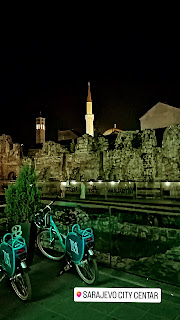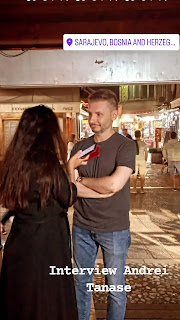Victoria hold my heart
What I found most enthralling about this German
film seen at the Berlinale, it was that Victoria has that foreboding
ambience that keeps giving off the vibe that something unfortunate is going to
happen any moment now …
Shot in real time, filmed in one continuous
take of 138 minutes, VICTORIA is made all the more believable by excellent performances.
The film covers a couple of hours in the life of Victoria (Laia Costa), a Spanish young woman visiting Berlin, who is hit on one late night at a club by Sonne (Frederick Lau) and winds up carousing with the charming flirt and his friends, Boxer (Franz Rogowski), Blinker (Burak Yigit), and Fub (Max Mauff), as they walk around the desolate city, drinking and hanging out on a rooftop. Victoria gradually develops a connection with the kind and gracious Sonne, after they steal beer from a market and make their way to a restricted rooftop. Just as they are about to part their ways, the eager-to-please Victoria agrees to serve as a driver to what is unknowingly a bank heist after a drunken Fub passes out. The job is done in a hurry with an adrenaline high for all and then panic sets in once police search the area for four thieves, finding Victoria and her new ‘friends’ desperately fleeing into the early morning hours in order to survive.
The film opens with the doe-eyed Victoria solo-dancing in the nightclub with cinematographer Sturla Brandth Grøvlen (who lensed “Rams” which premiered at last month’s Chicago International Film Festival and last year’s Kim Basinger thriller “The 11th Hour”, also shot in Germany) circling around her and following her from behind, as well as the Berlin boys she eventually hooks up. We’re underground, walking on streets, going up and down steps, inside a vehicle and in and out of a bank and a hotel. It may take some getting used to, but at no point will it make you queasy. If anything, Shipper’s approach to his real-time storytelling is hypnotic, even if it did make my eyelids heavy during the overlong first hour.
The
first half establishes the background of the characters. They stroll through the
streets and the roofs of a magic Berlin.
But the second half is one nail-biting tense thriller that siderites the
spectator!
The film is not just a story of crazy love
at first sight, and clearly it's not just a story of an assault. It is a film
about a young woman who, lost in the loneliness of her life, agrees to do
everything so that, at least for the least amount of time, she can get out of
the state in which her life is. In the state in which she was, no matter what
or who would appear in front of her… as for anyone in a tunnel being swallowed
by darkness, any light coming from their end is a sudden feeling of freedom.
And what an amazing and complex 138-minute one
take!!!! What do I have to say about it? Just WOW!!!!
It took 3 attempts to film the movie. The take used for the final cut was the third take and completed from 4:30 AM to 7:00 AM on 27 April 2014 in the Kreuzberg and Mitte neighborhoods.
Its single take lasting 138 minutes might
be the combined result of clever editing, seamless switching & careful
masking but what impressed me most is that despite it being an impressive
technical feat, it never for once overshadows the unfolding drama which remains
the centerpiece throughout its runtime.
The one-take approach here is not as stylized as last year’s “Birdman” and is a completely different film since there is a seamless shot, untouched by CGI. The filmmaking method used is fascinating (and crazy), but it’s not what held my interest. What interested me more about “Victoria” was the story taking place all within one time frame. That aspect reminded me of “Sleepless Night” one of my favorite thrillers of recent years.
The actors are highly convincing in their
given roles, their work gets better as the plot progresses, and it only helps
in further uplifting the story.
On an overall scale, Victoria ends
on a far better note than where it appeared to be heading during the first act,
keeps its main focus on the titular character from beginning to end, and
manages to be an emotionally rewarding experience with or without the one-shot
gimmick. Devoting as much attention to its story as it invests in seamlessly
pulling off its technically challenging production, this German thriller is one
of the finest films of this year, and comes thoroughly recommended.
Most of the negative critiques of this film
are about the technique, or that the single-shot challenge hides a shallow
story. But I quite liked the two-hour long romance between the title character
and Sonne, and the quick but tragic decisions they all make in the spur of the
moment.
I kept expecting a darker, more disturbing
film, sure that Victoria was heading toward sexual assault, which meant its
trajectory surprised me. Young people make really dumb decisions all the time,
which doesn't mean they're bad or evil, and "Victoria" embraces that
without judgment.
Unspooling in real time, it feels like a
day has passed between the nighttime streets and then the dawn light over
Berlin. There's magic in that too, which for anybody who has stayed up clubbing
or such can attest to, and "Victoria" captures it perfectly.
It seems cliché to say, but this is definitely a film where the camera itself feels like a character. In many ways, with such a visceral and exhilarating film, it feels like that character is the viewer. In the end, the audience may wind up being just as exhausted as Victoria. I certainly left the film with a “how’d they do that” feel. Despite the length taken to establish the characters in the first hour, the payoff of “Victoria” can be found in its rare and unique execution and its lead performance.
written by: Olivia Neergaard-Holm, Sebastian Schipper and Eike Frederik Schulz
produced by: Jan Dressler, Christiane Dressler and Sebastian Schipper
directed by: Sebastian Schipper
rated: unrated
runtime: 138 min.
U.S. release date: October 9, 2015
by Giulia Dobre








.jpg)










.jpg)